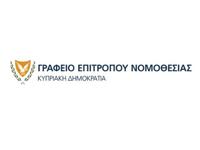Press Releases

12-04-2025 15:24
Address by the Commissioner for Gender Equality of the Republic of Cyprus, Ms Josie Christodoulou, at the “Women in Business & Beyond” Conference
I would like to thank Unity Growth and Mr Andreas Mathikolonis for the invitation and congratulate you for dedicating your event to women’s leadership, a key to gender equality and, by extension, to more successful business. The opportunity to jointly explore ways to create a more inclusive and impactful future with such a big number of women professionals and leaders is an important tool in our effort to promote women’s leadership in practical ways.
It is indeed true that we have come a long way when it comes to gender equality. However, it is still an undeniable fact that women and men do not enjoy equal access to opportunities in many sectors, including in business and leadership. Women, the majority of the population, are still underrepresented in business and in positions of decision-making. To understand why, we must frame the issue, by recognising the historic unequal power relations between women and men. We are well aware that women fought for their rights through time, they have many victories, they have broken many glass ceilings; they have unstuck from sticky floors and there are many successful business women, and some are here today amongst us. But we are not there yet. According to European Institute for Gender Equality (EIGE), Europe, the continent that scores best on gender equality, will still need 60 years to reach substantial equality, while worldwide we need 300 years. At the same time, I want to stress and make clear that gender equality is not a competition between women and men. It is about democracy, and it is also financially sustainable.
As I just mentioned, women make up half of the world’s global population, yet they are the minority in the world of business.
As a result, they do not have equal say on matters that affect them personally, their environment, and the quality of their professional life. The theme of today’s conference is a key element in the broader effort to change this and establish substantial gender equality.
Let’s have a look at numbers.
According to the 2023 European Union (EU) Labour Force Survey, although women constituted 46.4% of all employed people in the EU, their representation amongst managers was at 34.8%. In 2014, women accounted for 45.8% of people in employment and took up 31.8% of the managerial positions. The progress is slow.
Cyprus was the country with the largest increase of women managers in the course of the decade, by 10.5%, yet it remains at the lower end of the EU member states, holding the 23rd position. “Power” was also confirmed as the area with Cyprus’ weakest performance in the 2024 Gender Equality Index of the EIGE. The power indicator covers participation in political, economic, and social decision-making processes. At these three levels, the highest performance is recorded in the participation of women in the Council of Ministers with 37.7%, while their representation in the House of Representatives stands at 14%, in local administration at 15%, on the boards of the largest companies listed on the Cyprus Stock Exchange at 9%, on the boards of the public broadcaster at 11%, and on those of sports organisations at 10%.
These numbers confirm that leadership in all sectors is still dominated by men. In order to balance this, we need to first identify and address the causes, which are based on the historical unequal power relations.
According to She Figures 2021 data, in the EU, on average, at Bachelor’s and Master’s levels, women students outnumber men (54% and 59%, respectively). At Doctoral level, student numbers are almost gender balanced.
However, disparities between study fields persist. Why do they persist? Because gender stereotypes have through time dictated “appropriate” roles for women and men: family and home care. The invisible, unpaid work is considered a woman’s job, while men are expected to seek professional success and provide financial stability for their family. Consequently, professions are categorised into those “appropriate” for men and women. Moreover, leadership is mostly associated with traits such as assertiveness, competitiveness, and decisiveness which are perceived as “masculine”, while women are expected to demonstrate nurturing, emotional, and supportive behaviours that are less associated with leadership and which create a challenging dynamic for them, especially when they attempt to climb the ladder or assert their authority in male-dominated fields. As a result, women do not enjoy equal access to career development opportunities and face disproportionate burdens in balancing work and family responsibilities. This also leads to their absence from boardrooms.
Therefore, the growing call for gender balanced participation in leadership is driven by both ethical considerations and compelling business arguments. Let me highlight a few key benefits of having more women in decision-making roles:
- Improved financial performance: Research by McKinsey & Co. for the year 2023 has shown that companies with a higher percentage of women on their boards tend to financially outperform those with fewer women by 39%.
- Enhanced decision-making: A gender-balanced board is more likely to consider a broader range of viewpoints, leading to more balanced and informed decision-making. Women's leadership styles, which often prioritise collaboration and inclusivity, can help apply a more holistic approach to complex challenges.
- Innovation and diversification: Women's different life experiences and perspectives can spur new ideas and creative solutions, fostering an environment of innovation. Women-led businesses can help diversify industries and markets by introducing different products and services that may otherwise be overlooked.
- Risk management: Again, because of stereotypes, women tend to take a more cautious and risk-aware approach. Their involvement in decision-making can help boards better assess potential risks and make more calculated, strategic decisions that avoid short-term, high-risk manoeuvres in favour of sustainable growth.
It therefore becomes evident that by not having enough women in leadership, not only are women deprived of the chance to grow and prosper personally, but organisations themselves and society as a whole miss out significantly. This realisation prompts us to take action so as to deconstruct biases that hinder women's progress in ascending to top executive positions.
Dear friends,
Gender equality is a horizontal priority for Nikos Christodoulides’ government and this is the way we work, holistically and horizontally.
Our Office, which was established by law last July, is now responsible, amongst others, for formulating, coordinating, and evaluating the implementation of the National Strategy for Gender Equality in collaboration with all ministries and deputy ministries. The way we go about it is by applying gender mainstreaming in public policies. In other words, we do not just tick boxes, but we make sure that an action in one area is reinforced and complemented by actions in other areas. We work horizontally and holistically. Our strategy includes actions that promote and leadership directly or indirectly. Their implementation is based on collaborations between competent ministries and other stakeholders including the private sector. Allow me to highlight some of our targeted, but also holistic actions that are included in the strategy for Gender Equality and beyond specifically for the issue under discussion:
- Legislation: Our office took the initiative to accelerate the process of harmonising our national legislation with the EU Directive on the equal representation of women and men on the boards of listed companies. According to the Directive, listed companies should have boards on which members of the underrepresented sex hold at least 40% of non-executive director positions and at least 33 % of all director positions. To this end, we are currently working together with the Ministry of Energy, Commerce and Industry and the Law Commissioner to amend the Companies Law.
-The Ministry of Labour is already preparing for the transposition of the EU Directive on pay transparency into our legislation by 2026.
More specifically, it is currently running a preparatory process, evaluating and designing the infrastructure needed, as well as the practical aspects of introducing new legislation and measures.
- Understanding further the problem: Addressing the gender salary gap, which currently stands at around 10%, we are conducting a survey to identify any distortions between professions, mostly those considered either “male-dominated” or “female-dominated”. The aim is to identify the criteria that determine pay and to assess the extent to which gender plays a role in the process. The Ministry of Labour and Social Insurance will conduct its own qualitative analysis of the salary gap between men and women.
- Reconciliation of family, personal, and professional life: Policies such as the extension of maternity leave to 22 weeks, the extension of parental leave until the child reaches the age of 15, the gradual increase of care structures for children and the elderly through the EU’s Recovery and Resilience Facility (RRF), and the introduction of compulsory pre-primary education from the age of 4 will benefit more women and will allow parents the time to fulfil their professional ambitions and advance.
- Promoting role models: In order to break gender segregation in employment, we launch an annual thematic campaign under the umbrella title “HerStory”. Through the personal stories of successful women leaders in male-dominated fields, we provide role models for other women and girls to follow in their footsteps.
Another example includes our annual essay-writing contest, titled “What I would change if I were a minister for a day”, which is addressed to female third year students of public, private, and technical lyceums and aims at enhancing women’s leadership and representation in decision making processes. Winners become shadow ministers for a day.
- Training: At the same time, from this school year, the Ministry of Education has introduced training for career advisers in schools aimed at breaking stereotypes and unconscious biases. This way, students – girls and boys – will be guided to select their professional path based on their inclinations and preferences rather than on their gender.
- Strengthening Collaborations: As regards corporate practices, last summer, our Office and the Cyprus Chamber of Commerce and Industry jointly formulated an “Action Plan for gender equality”. Through specific actions listed in the form of recommendations, the goal is to promote gender equality in the operation of business organisations. We recently signed a Memorandum of Cooperation (MoC) with the Technical Chamber aiming at enhancing women's participation and addressing discrimination and prejudice in the working environment in engineering fields and in technical professions. Soon, we will launch a similar collaboration with the Cyprus Employers and Industrialists Federation (OEB).
Dear friends,
The above are some of our holistic efforts to bridge the pay gap and also provide women with space and the possibility to have a choice, a free choice, to be what they aspire to be. To lead the way.
In closing, I would like to stress that gender equality in business leadership is a shared responsibility of all and requires a collective effort. Together, we must challenge biases and advocate for change at every level. We must create environments where women can not only participate, but lead, and where their contributions are valued and celebrated.
We are at a critical juncture in history, and the choices we make today will shape the future of business and thereof the society for generations to come.
The time is now to break down the barriers that prevent competent and talented women from rising to the top and contributing to the business community in ways that will benefit everyone.
Thank you.
(ΑΑ/ΝΖ/GS)







